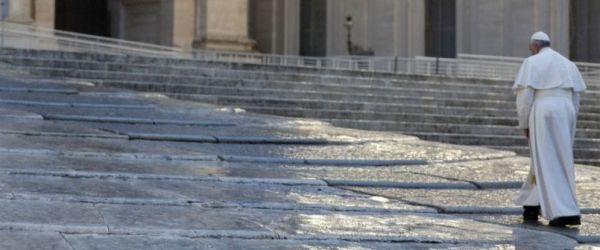The liturgy of this Fourth Sunday of Advent focuses on the figure of Mary, the Virgin Mother, expecting the birth of Jesus, the Saviour of the world. Let us fix our gaze upon her, a model of faith and of charity; and we can ask ourselves: what were her thoughts in the months while she was expecting? The answer comes precisely from today’s Gospel passage, the narrative of Mary’s visit to her elderly relative Elizabeth (cf. Lk 1:39-45). The Angel Gabriel had revealed that Elizabeth was expecting a son and was already in her sixth month (cf. Lk 1:26, 36). So the Virgin, who had just conceived Jesus by the power of God, set out with haste for Nazareth, in Galilee, to reach the mountains of Judea, and visit her cousin.
The Gospel states: “she entered the house of Zechariah and greeted Elizabeth” (v. 40). Surely she congratulated her on her maternity, as in turn Elizabeth congratulated Mary, saying: “Blessed are you among women, and blessed is the fruit of your womb! And why is this granted me, that the mother of my Lord should come to me?” (vv. 42-43). And she immediately lauds Mary’s faith: “And blessed is she who believed that there would be a fulfilment of what was spoken to her from the Lord” (v. 45). The contrast is obvious between Mary, who had faith, and Zechariah, Elizabeth’s husband, who doubted, and did not believe the angel’s promise and therefore is left dumb until John’s birth. It is a contrast.
This episode helps us to interpret the mystery of man’s encounter with God in a very special light. An encounter that is not characterized by astonishing miracles, but rather, is characterized by faith and charity. Indeed, Mary is blessed because she believed: the encounter with God is the fruit of faith. Zechariah, however, who doubted and did not believe, was left deaf and dumb. To grow in faith during the long silence: without faith one remains inevitably deaf to the consoling voice of God; and incapable of speaking words of consolation and hope to our brothers and sisters. We see it every day: when people who have no faith, or who have very little faith, have to approach a person who is suffering, they speak words suited to the occasion, but they do not manage to touch the heart because they have no strength. They have no strength because they have no faith, and if they have no faith they do not find the words that can touch others’ hearts. Faith, in its turn, is nourished by charity. The Evangelist recounts that “Mary arose and went with haste” (v. 39) to Elizabeth: with haste, not with distress, not anxiously, but with haste, in peace. “She arose”: a gesture full of concern. She could have stayed at home to prepare for the birth of her son, but instead she takes care of others before herself, showing through her deeds that she is already a disciple of that Lord whom she carries in her womb. The event of Jesus’ birth began in this way, with a simple gesture of charity; after all, authentic charity is always the fruit of God’s love.
The Gospel passage about Mary’s visit to Elizabeth, which we heard at Mass today, prepares us to experience Christmas properly, by communicating to us the dynamism of faith and charity. This dynamism is the work of the Holy Spirit: the Spirit of Love who made Mary’s virginal womb fruitful and who spurred her to hasten to the service of her elderly relative. A dynamism full of joy, as seen in the encounter between the two mothers, which is entirely a hymn of joyful exultation in the Lord, who does great things with the little ones who trust in him.
May the Virgin Mary obtain for us the grace to experience an ‘extroverted’ Christmas, but not a scattered one: extroverted. May our ‘I’ not be at the centre, but rather the ‘You’ of Jesus and the ‘you’ of brothers and sisters, especially of those who need a hand. Then we will leave room for the Love that, even today, seeks to become flesh and to come to dwell in our midst.
[Pope Francis, Angelus 23 December 2018]












